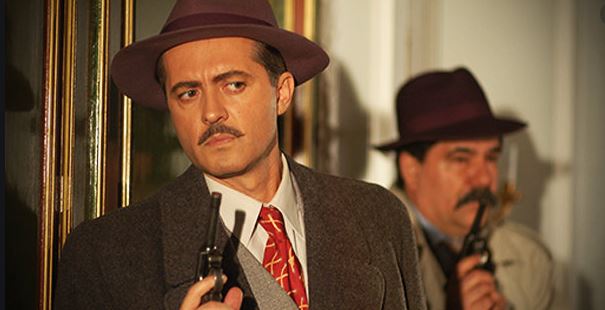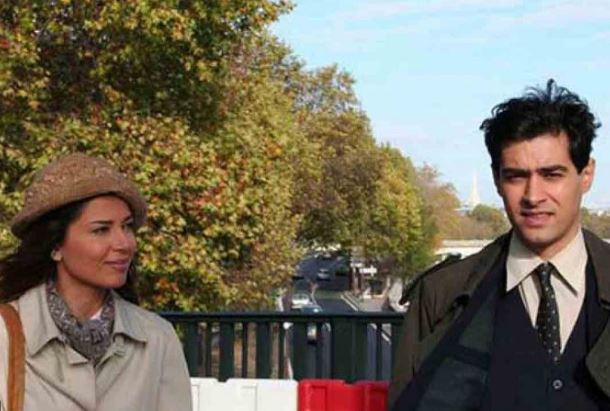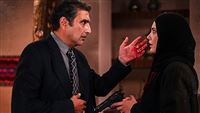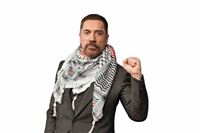In a media interview, Lebanese actor Pierre Dagher co-starring in ifilm series ‘Zero Degree Turn’ talks about his role as police major.
Major Behrouz Fattahi is one of the characters in ‘Zero Degree Turn’ depicting a typical Iranian in the police department with the characteristics of a hero in the series by Hassan Fathi. The character embodies a mixture of conscientiousness, human feelings, toughness and mental sharpness. Perhaps apart from the characterization, there is another point that makes Detective Fattahi attractive to the viewers, and that is the beauty in the acting of the thespian appearing in this role.
Pierre Dagher is the actor who brought this role to life, an Arab actor living in Beirut. He was invited to the series when Fathi insisted him to join, and with a slight change in his face and type of acting, he became his Iranian counterpart in the series.
Below are some parts of the media interview with the actor translated from Persian to English.
How did you get to know about the series ‘Zero Degree Turn’? Did you know Hassan Fathi before this collaboration?
Actor: I met Mr. Fathi two years before starting to work on the series ‘Zero Degree Turn’. He had previously come to Beirut to make a feature film titled ‘Remember Your Dreams’, and I worked with Nadi Ibrahim [who plays Theodore in the series]. He told me that he was writing a historical series, and after he returned to Iran, we were in contact with each other, and when the work started, I was invited to Iran to play the role of Major Fattahi.
What have you known about Iranian cinema and television before entering Iran and playing in this series?
Actor: For sure, I was already familiar with it, but working conditions were not very clear. I had previously worked with some Iranian film crews who had come to Beirut and had a general knowledge of Iranian cinema. When I saw the camerawork and production in Iran, I realized that they work calmly and with no rush, and this was very good for me. They were very careful that their work went well and the final product came out decent. In my opinion, Iranians work very calmly in both serious [artistic] cinema and general [commercial] cinema. In Lebanon, I went behind-the-scenes of some Iranian films set in Lebanon and got to know Iranian cineastes. I even saw some titles that were made for film festivals, and I was very positively surprised.
Personally speaking, what movies or series from Iranian cinema and television have impressed you?
Actor: I remember the series ‘Prophet Joseph’ filmed here. By the way, when I came to Tehran, the filming for ‘Child of the Morning’ was underway in the Cinema Town, and there I met Behrouz Afkhami. I have an Iranian friend named Saeed Malekan who worked as a makeup artist in Lebanon. He and I would talk about issues regarding Iranian cinema. In general, I have had the chance to know Iranian cinema in recent years, and before that I did not know much about your cinema.
Have you seen a film about prominent Iranian filmmakers such as Abbas Kiarostami and Rakhshan Bani-Etemad?
Actor: Unfortunately, Iranian cinema is less known to the Arab world, and the people in Arab countries have not been introduced to this cinema.
All in all, how do you evaluate Iranian cinema in comparison to the cinematic traditions of other countries?
Actor: I cannot comment on the great Iranian cinema. But I believe that you have a different cinema and that the variety of your films is very high. Some of your films are global at highest level of the world cinema, and I know that some of your films have been praised at international festivals. In general, both your TV products and movies have international standards in all respects and can be among the best.
Have you managed to watch the series ‘Zero Degree Turn’?
Actor: Not yet. But I have heard about it here and there. Recently, I played in the second season of ‘Khalid bin Waleed’ series, in which Iranian makeup designers who worked with Abdullah Eskandari were among the crew. They went to Iran and came back during the time the series aired on Iranian channels. So the very same friends told me how I was in various episodes and how I played. Anyway, I would like to watch it myself.
Did you even see part of your acting in the shooting and editing stages?
Actor: Not at all. They, however, promised that I would get a DVD when the series ended.
If possible, compare acting in Lebanese cinema and television with what you did in this series to offer a better picture of the cinematic traditions in the two countries.
Actor: You are really more advanced than us and it will take a long time for us to progress in this area. Some of the topics you make films about, we've worked less on them, one is human themes. It is very difficult for us to get into human issues at all, but you have experienced such subject matter many times. I hope that our cinema will be able to work on various topics.

You have historical roles in the series ‘Khalid bin Waleed’ and ‘Zero Degree Turn’. How do the two countries compare in this genre?
Actor: In the Arab countries, when we make a historical series, we try to finish it in a few months. The purpose of this type of series is to broadcast more during the holy month of Ramadan and it has a commercial [entertainment] aspect. We do not go into much detail in these series. Our directors put all their energy into production as quickly as possible and are kind of in a hurry. But in your historical works, the situation is different. You pay attention to the smallest details in costume design, filming, etc. and try to put everything in the right place. It is because of these aspects that Iranian cinema is more successful than that of the Arab world.
Have you collaborated with other countries as an actor?
Actor: Yes. Countries like Syria as people speak Arabic.

You co-starred with actors from several countries such as Iran, France, Hungary and Lebanon in the series ‘Zero Degree Turn’. Working in a series in which everyone talk in their own language was probably a completely new experience for you, is that so?
Actor: This series was my most important work experience. I think it was a valuable experience and of course, I had a hard job to do. It was an experience I will always talk about and never forget.
Does playing opposite someone who spoke another language while you respond in your own language reduce the quality of your acting and feeling a bit?
Actor: In scenes from the series where I played with non-Arab actors, I did not understand at all what the actors in front of me were saying, that is, I knew the content but did not understand it word for word. Well, it affected my emotions, but I tried to put more strength and energy into it and played my role to the best of my ability.
Of course, your efforts can be seen, and the reason is that the viewers of the series could relate to you as one of the three main characters.
Actor: It is very important for me to know what the viewers think about my performance. What do they think? What do people say? Do they like it or not?
As I said, your work has been seen and many did not even think that you were a foreign actor before reading the interview.
Actor: How interesting! I would be glad if this is what people would think. I really like my role as an emotional, brave and courageous character. I must say that it is an honor for an actor to be able to play different roles.
Did you feel that you were playing as an Iranian while shooting for the series?
Actor: I cannot compliment myself. I just have to say that I was trying to bring that role to life and I was trying my best to do well because success in this role was very important to me.
Now that I hear your voice, I feel the voice of Bahram Zand, who was the voice actor for your role, is very similar to yours.
Actor: When I was in Iran, I met the voice actor of my role in person and saw the dubbing of Iranian films up close. Your giant dubbing industry for Iranian cinema and television is very strong. Surely when I see the series, I will be surprised and may not even recognize myself there. It is very important that they find a voice that is close to my own voice, I know that the person who lent his voice to my character is a successful and experienced person, and this, in turn, contributes to the quality of my acting.
How did you work with Hassan Fathi?
Actor: I was very comfortable. I should thank him and the producer here because I really felt at home.
I mean your relationship with him as the director of the series.
Actor: He was accurate in directing and I did not feel any shortcoming there.
Given that a middle person as a translator conveyed your views and those of the director, did such an issue deter a better relationship between the actor and the director?
Actor: The translator plays an important role in this type of collaboration. He must be trustworthy and able to convey the feelings of the two sides. Here the translator considered these factors. But he and I tried to be friends and get used to each other. This intimacy had a great impact on the outcome. Not only did the translator do the word-for-word translation, but he also tried to explain the meaning of the sentences.
How was your relationship with other actors?
Actor: I made good friends in this series and was particularly close to Shahab Hosseini.

What about in the filming locations and during your acting?
Actor: The actors of the series tried to make me feel comfortable to have a better emotional relationship with them. They took me to traditional restaurants and coffee shops and talked to me about Iran. They wanted me to feel like I was in the same family with them. The bond also had an influential role in our performances.
In your opinion, what is the quality of acting in the case of Iranian actors?
Actor: First, Iranian actors are very capable. They also play a variety of roles, and this affects the quality of their acting. I learned a lot from them during this collaboration.
Would you like to come to Iran again and play in a movie this time?
Actor: Yes. I like Iranian cinema very much and am interested in playing some roles in movies. Working in Iran was a good experience for me, and if a good script is offered, I will definitely go for it.
Besides your acting, a few other Arab actors also played in the series ‘Zero Degree Turn’, what do you think of this?
Actor: It was a new experience for Iranian television, I mean working with international actors. This experience is repeatable, and I think it was a new flavor offered by actors from several countries. When a big project is set to be done, a string of strong talents must come together and the human resources are of importance here.
AG/AG















